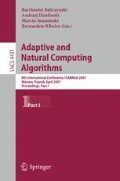Abstract
In many situations a robust design could be expensive and decision-makers need to evaluate a design that is not robust, that is, a design with a probability of satisfying the design specifications (or yield) less than 100 %. In this paper we propose a procedure for centring a design that maximises the yield, given predefined component tolerances. The hybrid approach is based on the use of Evolutionary Algorithms, Interval Arithmetic and procedures to estimate the yield percentage. The effectiveness of the method is tested on a literature case. We compare the special evolutionary strategy (1+1) with a genetic algorithm and deterministic, statistical and interval-based procedures for yield estimation.
Access this chapter
Tax calculation will be finalised at checkout
Purchases are for personal use only
Preview
Unable to display preview. Download preview PDF.
References
Hendrix, E.M., Mecking, C.J., Hendriks, T.H.B.: Finding Robust Solutions for Product Design Problems. European Journal of Operational Research 92, 28–36 (1996)
Hadjihassan, S., Walter, E., Pronzato, L.: Quality Improvement via Optimisation of Tolerance Intervals During the Design Stage. In: Kearfott, R.B., Kreinovich, V. (eds.) Applications of Interval Computations, Kluwer Publishers, Dordrecht (1996)
Li, M., et al.: A multi-objective genetic algorithm for robust design optimization. In: GECCO Proceedings, pp. 771–778 (2005)
Jin, Y., Branke, J.: Evolutionary Optimization in Uncertain Environments - A Survey. IEEE Transactions on Evo. Comp. 9(3) (2005)
Tsutsui, S., Ghosh, A.: Genetic Algorithms with a Robust Solution Searching Scheme. IEEE Transaction on Evolutionary Computation 1(3), 201–208 (1997)
Loughlin, D.H., Ranjithan, S.: The Neighborhood constraint method: A Genetic Algorithm-Based Multiobjective Optimization Technique. In: Bäck, T. (ed.) Proceedings of the Seventh International Conference on Genetic Algorithms, July 1997, pp. 666–673. Morgan Kaufmann, San Mateo (1997)
Rocco, C.: A hybrid approach based on evolutionary strategies and interval arithmetic to perform robust designs. In: Rothlauf, F., Branke, J., Cagnoni, S., Corne, D.W., Drechsler, R., Jin, Y., Machado, P., Marchiori, E., Romero, J., Smith, G.D., Squillero, G. (eds.) EvoWorkshops 2005. LNCS, vol. 3449, pp. 623–628. Springer, Heidelberg (2005)
Moore, R.: Methods and Applications of Interval Analysis. SIAM Studies in Applied Mathematics. SIAM, Philadelphia (1979)
Neumaier, A.: Interval Methods for Systems of Equations. Cambridge University Press, Cambridge (1990)
Hansen, E.: Global Optimization Using Interval Analysis. Marcel Dekker Inc., New York (1992)
Schwefel, H.P., Back, T.: Evolution Strategies I: Variants and their computational implementation. In: Periaux, J., Winter, G. (eds.) Genetic Algorithm in Engineering and Computer Science, John Wiley & Sons, Chichester (1995)
Kursawe, F.: Towards Self-Adapting Evolution Strategies. In: Tzeng, G., Yu, P. (eds.) Proc. Of the Tenth International Conference on Multiple Criteria Decision Making, Taipei (1992)
Michalewicz, Z.: Genetic Algorithms + Structures Dates = Evolution Programs. Second Edition. Springer, Heidelberg (1994)
Spence, R., Singh, S.: Tolerance Design of Electronic Circuits. Addison-Wesley, Wokingham (1988)
Saltelli, A., Chang, K., Scott, M.: Sensitivity Analysis. John Wiley & Sons, Chichester (2000)
Jaulin, L., Kieffer, M., Didrit, O., Walter, E.: Applied Interval Analysis. Springer, London (2001)
Author information
Authors and Affiliations
Editor information
Rights and permissions
Copyright information
© 2007 Springer Berlin Heidelberg
About this paper
Cite this paper
Pierluissi, L., Rocco S., C.M. (2007). Optimal Design Centring Through a Hybrid Approach Based on Evolutionary Algorithms and Monte Carlo Simulation. In: Beliczynski, B., Dzielinski, A., Iwanowski, M., Ribeiro, B. (eds) Adaptive and Natural Computing Algorithms. ICANNGA 2007. Lecture Notes in Computer Science, vol 4431. Springer, Berlin, Heidelberg. https://doi.org/10.1007/978-3-540-71618-1_4
Download citation
DOI: https://doi.org/10.1007/978-3-540-71618-1_4
Publisher Name: Springer, Berlin, Heidelberg
Print ISBN: 978-3-540-71589-4
Online ISBN: 978-3-540-71618-1
eBook Packages: Computer ScienceComputer Science (R0)

